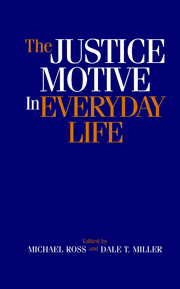Book contents
- Frontmatter
- Contents
- List of Contributors
- Introduction
- Theoretical Perspectives on the Justice Motive
- 3 Doing Justice to the Justice Motive
- 4 The Justice Motive in Persepective
- 5 Perverse Justice and Perverse Norms: Another Turn of the Screw
- 6 Justice Motivation and Moral Motivation
- Victim Derogation and the Belief in a Just World
- The Justice Motive and Prosocial Behavior
- Justice-Based Reactions to Transgressors
- Justice and Reaction to One's Own Fate
- Name Index
- Subject Index
3 - Doing Justice to the Justice Motive
Published online by Cambridge University Press: 08 September 2009
- Frontmatter
- Contents
- List of Contributors
- Introduction
- Theoretical Perspectives on the Justice Motive
- 3 Doing Justice to the Justice Motive
- 4 The Justice Motive in Persepective
- 5 Perverse Justice and Perverse Norms: Another Turn of the Screw
- 6 Justice Motivation and Moral Motivation
- Victim Derogation and the Belief in a Just World
- The Justice Motive and Prosocial Behavior
- Justice-Based Reactions to Transgressors
- Justice and Reaction to One's Own Fate
- Name Index
- Subject Index
Summary
In 1977, Melvin Lerner's article “The Justice Motive: Some Hypotheses as to Its Origins and Forms” was published in the Journal of Personality. In my view this is the best piece about justice ever written by a psychologist. The article outlined all essential features of a meaningful psychological construction of a justice motive: the “categorical” normative quality of justice; the justice motive as a primary or “primordial” motive rather than a derivative of other motives, such as self-interest or social responsibility; the important role that deservingness plays in the perception of entitlements and in appraisals of distributions and social exchanges as just or unjust; and the diversity of manifestations that this motive can take. Later on, this line of conceptualization was further elaborated and enriched by new empirical evidence and theoretical arguments (cf. Lerner, 1980, 1987, 1996, 1998). Yet Melvin Lerner's conception of the justice motive was not embraced by all justice scholars. In this chapter, I will address and support one of the most controversial claims of Lerner's justice conception, namely, that justice is a primary and not a secondary or derived motive. Justice as a Normative Standard Justice is “a” normative standard for evaluation. The normative, prescriptive nature of justice has to be taken into account in every analysis as well as in empirical research.
- Type
- Chapter
- Information
- The Justice Motive in Everyday Life , pp. 41 - 62Publisher: Cambridge University PressPrint publication year: 2002
- 12
- Cited by



